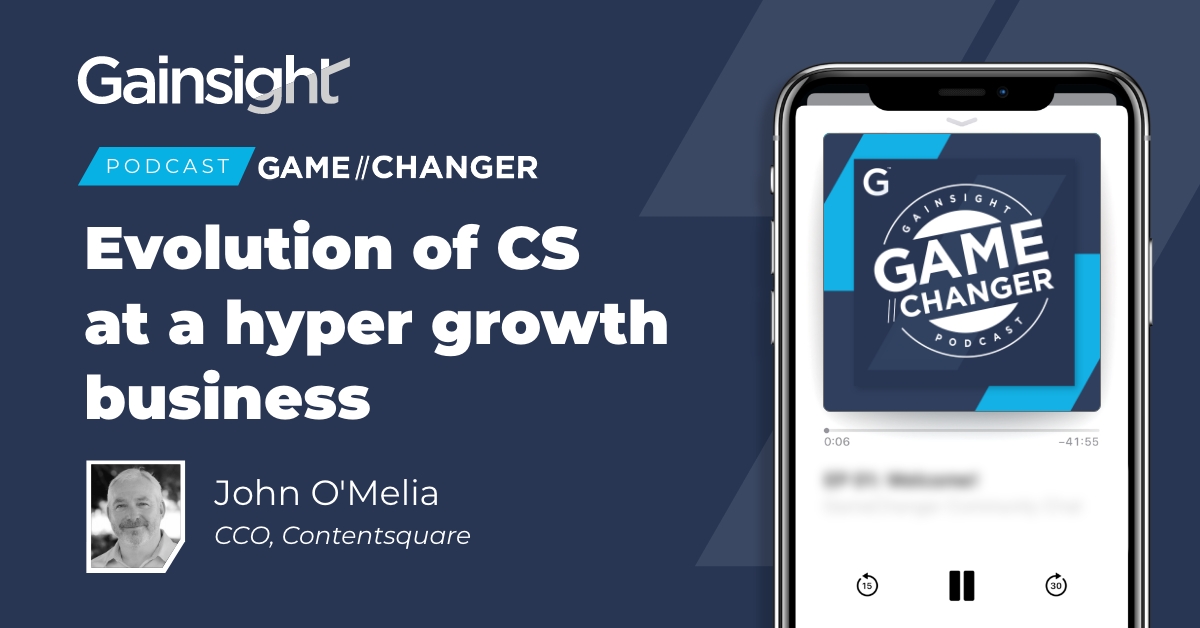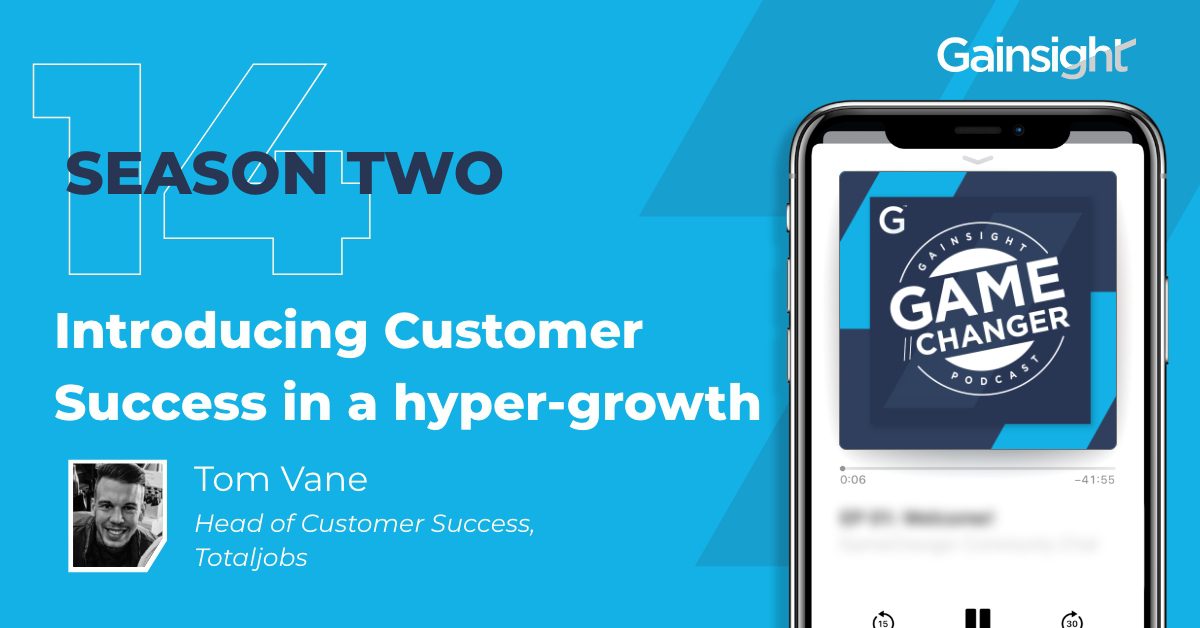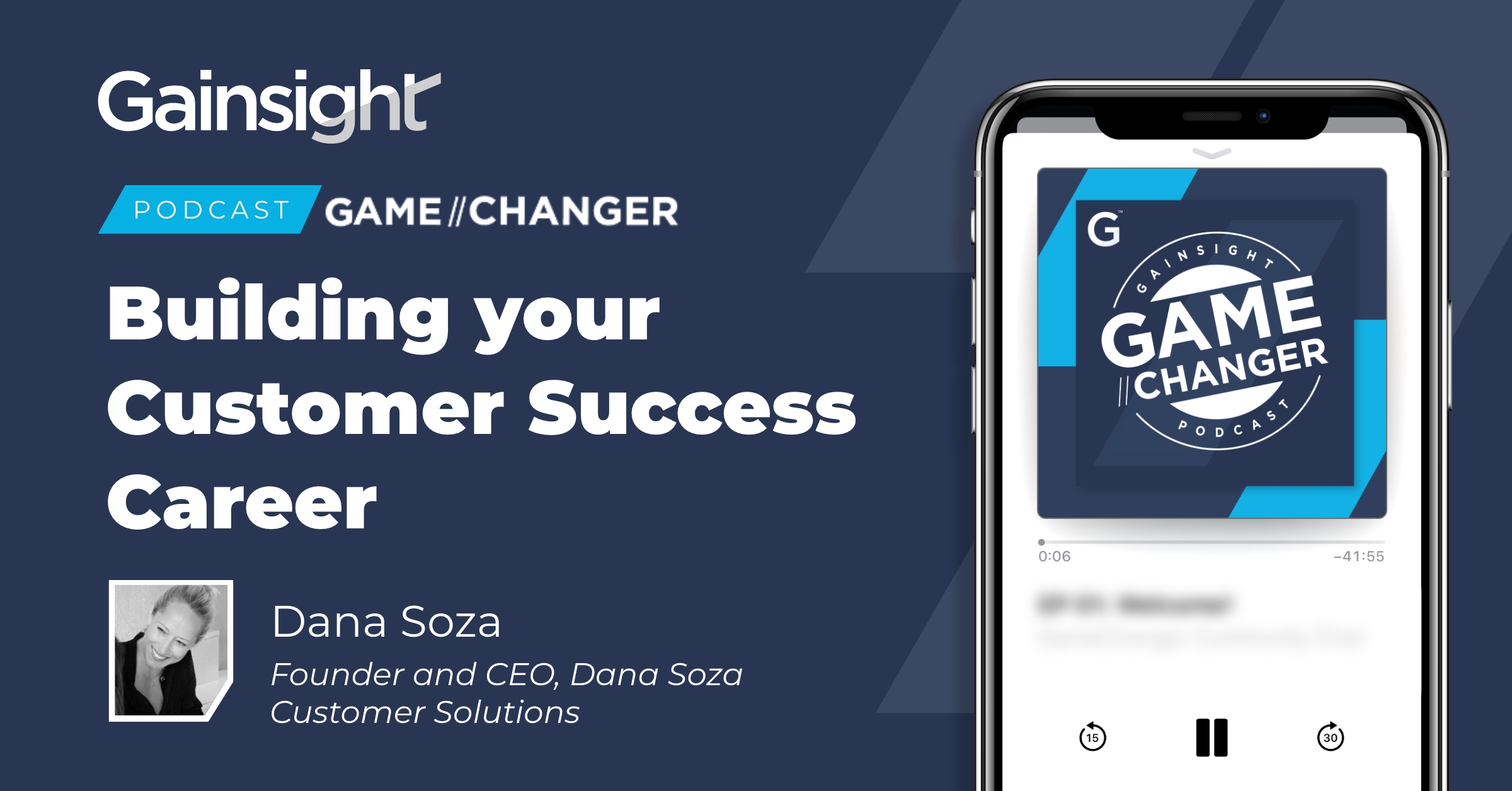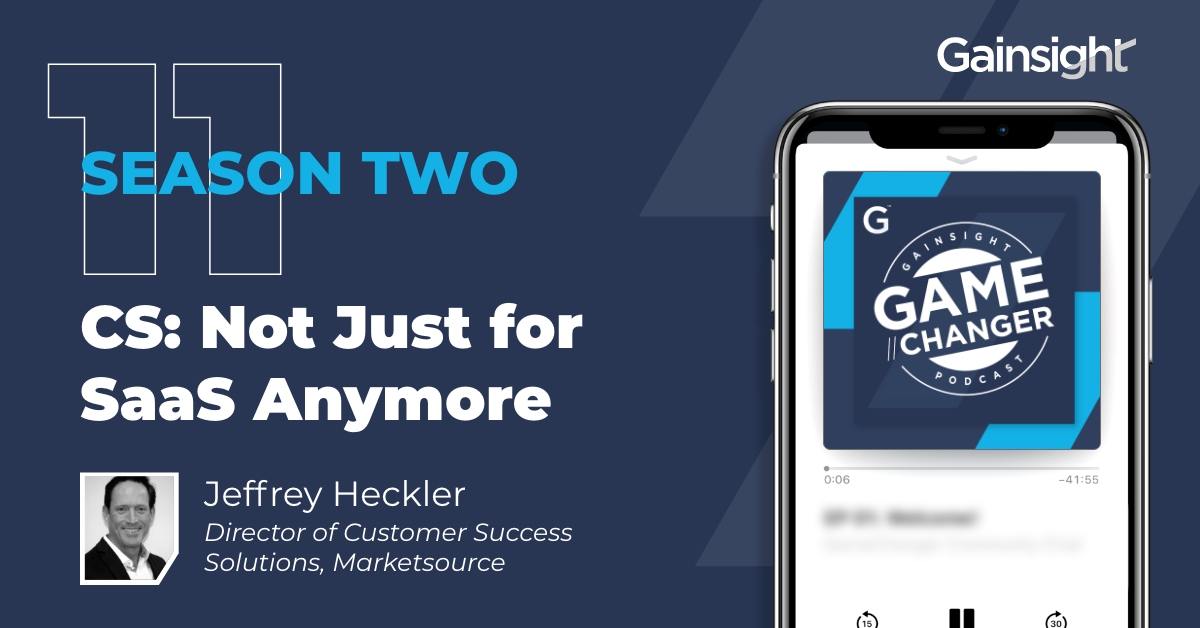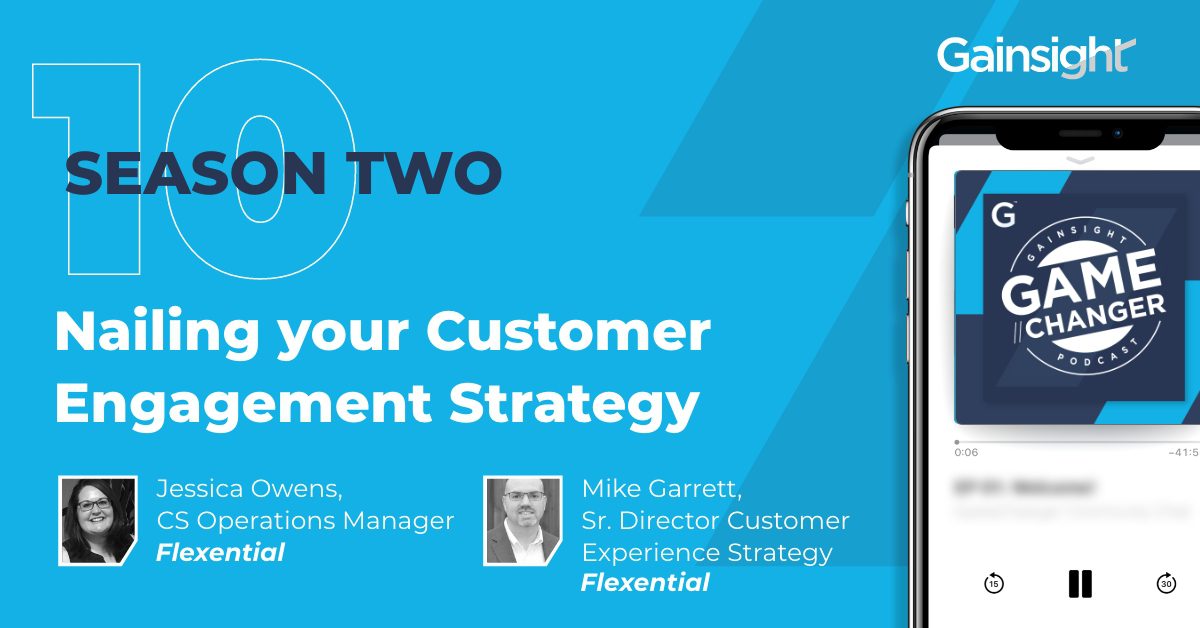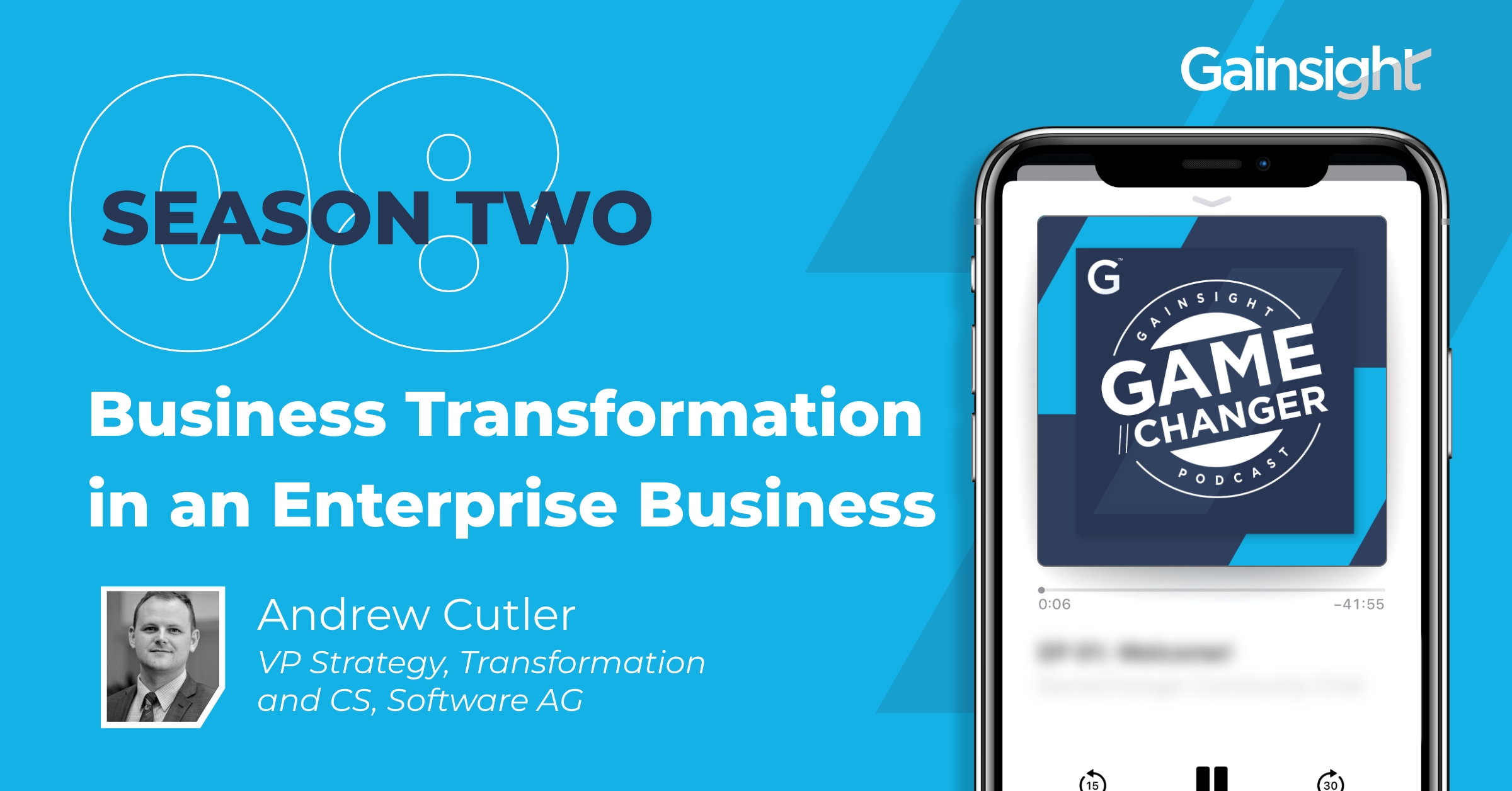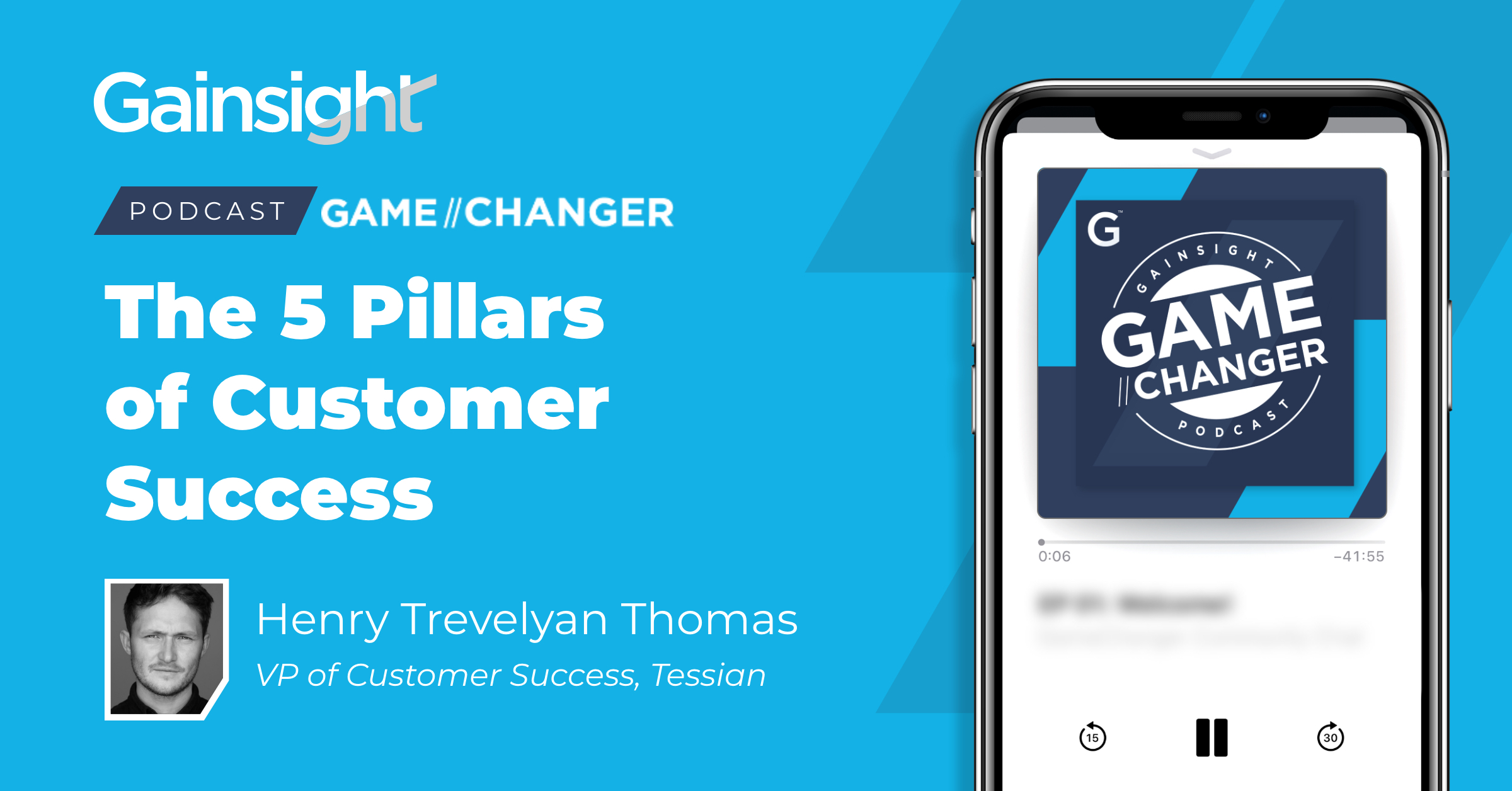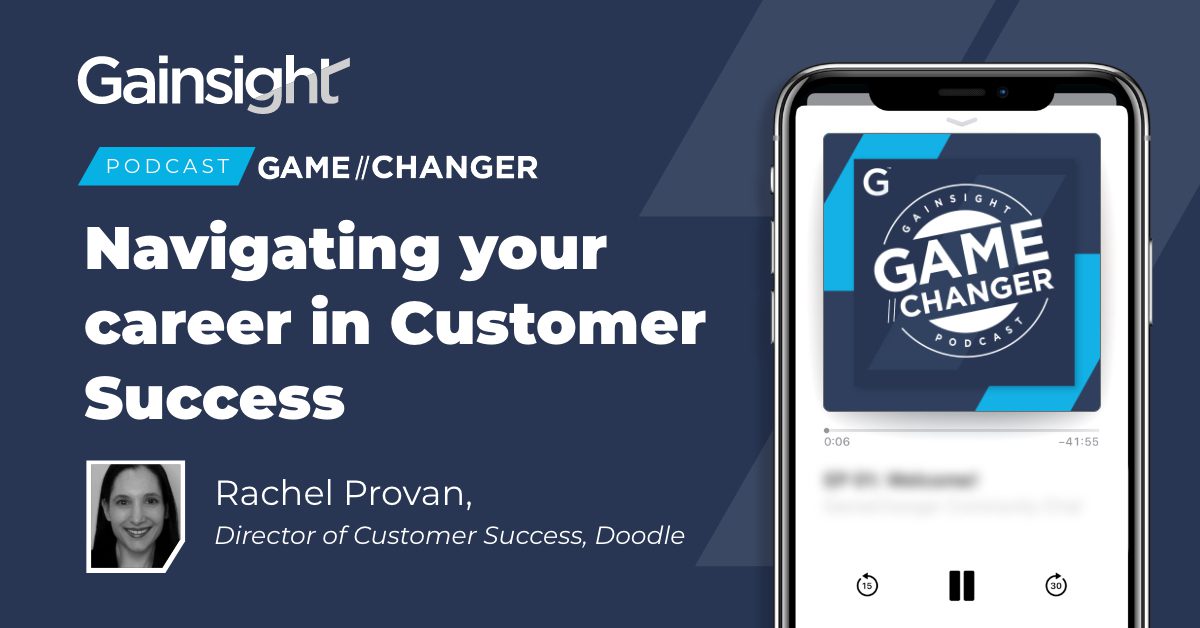In episode 2 of the Gainsight Gamechanger Podcast, Adam Joseph, Director of Customer Success, EMEA at Gainsight sits down with Elise Meijer, Senior Customer Success Manager at LinkedIn.
Listen to the full episode and access Adam's summary by unlocking the content.
Subscribe today on: Apple Podcasts | Spotify | Google Podcasts
Ep 02: COVID-19: Impact and State of Customer Success in France
From the moment that COVID-19 arrived, it has had an impact on all of us on so many levels. However, I have to admit that when it comes to the pandemic's effect, we usually hear the US or the UK perspective. Even concerning customer success. In a recent podcast, I was delighted to be joined by Elise Meijer, a Senior Customer Success Manager at LinkedIn. Elise is based in Paris, where she lives with her family. As we discussed the effects that she has seen personally through the time of COVID-19, I realised that trends and events were happening in Paris and France that perhaps the rest of us were not aware of.
Elise moved to France In 2007, where she worked to build, coach, and develop the French Customer Success team for LinkedIn. In addition to her leadership responsibilities, Elise manages strategic enterprise accounts from a customer success and analytics perspective. Elise is also a working mom of three, which means finding and keeping a proper work-life balance. In her downtime, she enjoys all the goodness of Paris and France, her second home country. But in the current pandemic, that, unfortunately, means staying away from her favourite places, like the French Riviera.
The CSM-Parent
Like most of us who work from home, I was curious about what Elise was doing to keep the work-life balance. She shared that she keeps busy being a mother and everything related to it, especially spending time with her three children on schoolwork. Her view on it was refreshing. Elise incorporated her skills as a customer success manager to help her kids.
"I guess that I rediscovered in a way, how to do something that I enjoy in my work as a customer success manager. I explain everything in a way that is understandable for them. I try to be creative about any type of topic that we spend time on." If she is that way with her children, I can imagine how much patience and empathy she has as a CSM.
On a professional level, Elise described herself as a customer success addict. "I'm a customer success advocate with a strong background in talent acquisition," she explained. "I started my career in the Talent Acquisition industry twelve years ago, and after a managing position in a global industrial company, I had the opportunity to build up my career in customer success in the SaaS industry by joining LinkedIn almost eight years ago."
The French Transition of Working Remotely
I asked Elise about the impact of COVID-19 on the CS industry in France. I was very keen because everyone's perspective is slightly different. Even more than that, so much is written from a non-European or world view. I would venture to say that we haven't heard what transpires in the field of Customer Success in the French region.
"It's an interesting question, and I do agree with you," Elise began, "that so much has already been written, obviously, because we are all in the same situation. Whether you are a customer, or whether you're a CSM, we are all facing the same challenges." Then Elise expanded by enlightening us on the current situation in France.
"If we look at the macro level, the government here in France has actually started rolling out a number of precautionary measures. At the beginning, they closed down all the borders and they asked all companies to close their physical offices and start broadly asking companies to offer remote policies. So, all of a sudden, all employees and all employers found themselves in a situation of working from home."
Elise explained that for many companies, depending on the industry, it was a completely new transition and a profound change. Some were ill-prepared because they were not tech-savvy, or might not have an I.T. infrastructure that was well adapted or well equipped to offer remote work. Working closely with her customers, she immediately noticed that not everyone was prepared or well-equipped to work remotely from home.
"For the first couple of weeks or so, customers were seeking new ways to be productive and finding alternative and creative ways of keeping up with the business." Elise found there was more demand and dependency on CSMs. "As a CSM, you have to be flexible, understandable, and empathic when it comes to working with your customers. We're all facing these challenges."
Elise gave an example of how companies struggled to make the transition of work from home. If they did not allow flexible work arrangements like teleworking in the first place, they might not be comfortable with employees adapting to working from home. "That's a huge game-changer! And that really takes time," Elise said.
She is absolutely right. The CS industry is seeing a recent surge in digital transformation. But it is not without its difficulties. Generally, converting a company to a digital work environment might have taken months previously. Now, companies must do it in weeks in order to survive. With that speed can often come a few bumps along the way. I asked Elise for tips or advice for others trying to negotiate and work effectively while staying committed at home for the first time
Staying Productive
There were a few key takeaways of keeping up the productivity that Elise gave. Depending on your situation, you may or may not face some challenges. In the end, we all can find smart ways to be productive in a new, fully remote environment. "Personally, what really helped me as a customer success professional was to think in a compassionate way and be understandably flexible towards myself.
Elise found that the more she applied this philosophy, she could be compassionate and understandable towards her customers who were also working from home. "It can be challenging already under normal circumstances. But really, we are all working from home during COVID time. It is about accepting the situation as it is, and embracing change."
There are two distinct elements in being productive that Elise identified. First of all, it's all about setting yourself, your organisation, and your team up for success. If you want to be successful, the tech side of your business should be in order. You must ensure that your team and company is well equipped with the necessary tech and productivity tools. Ideally, you should have your workspace, even if that means working from a non-traditional office. For companies that are not very familiar with working from home, the shift towards that remote workplace can be challenging. And if you're in that situation, definitely challenge your employer to ensure that the basics for success are in place.
The second element is trying to balance your work-life situation. Elise shared, "You have to ensure that there's clear communication around basically everything: your expectations, how you'd ideally like to work regular check-ins with your team, but also with your customers. How would you ideally prefer to work? Would you prefer to work either in the morning, in the late afternoon, and so on?" By asking all of these questions, Elise believes you can ensure to build in a cadence and a structure for you and your customer. She also suggested that you must keep in touch with your team and with your customers. You must avoid total potential isolation.
For CSMs, Elise emphasised regular catch-ups, checking in with the customers, and continuing with your business as usual, but then in a virtual format. "During the pandemic, everyone started to think in a different way. Definitely a topic that's currently being addressed, whereas previously, during normal circumstances, we probably wouldn't spend as much time on that." Elise believes consistency in contact helps not only the customer but also ensures a proper work-life balance. How do you accomplish this? Set expectations and boundaries.
"I think, again, it's very important to set expectations there as well and set boundaries," Elise stressed. "As you would typically do when you leave the physical office in the evening to get back home. I think it's all about creating an environment where everyone feels happy and safe. And where your health and well-being are prioritised."
The New Normal
What's interesting is that often I hear the question, "When will we get back to normal?" I don't think there is a normal, as we used to call it. I think where we're going to find a new normal that will be different to where we are now, which is a COVID impacted world. It will be different from the pre COVID world. There will be a post COVID world, and how it relates to our work within customer success will be interesting.
The truth is that many more companies had to shift very quickly to fully remote staff and deal with customers remotely. Even if we return to office work, there will be remote work elements that still linger on. The fact is that organisations are comfortable having a work from anywhere type of policy. I asked Elise her thoughts and if this will change in the future. Her response was exciting and provocative.
"Personally, I love working from home, even though it can be a learning curve. It's a change. If you're not used to it, you definitely have to be thoughtful of just building out enough time to adjust, close down your laptop, and spend time doing other things. What really intrigues me is that no one has the perfect answer yet."
It turns out that Elise was interested in teleworking, remote working policies, and how employers would create a working environment with enough flexible working options back in college. It was as if she could see the future of working from anywhere. "I guess that I was always interested in the future work, and what it actually could be."
With the Coronavirus forcing millions of families to work from home, experts say that remote work might become the new normal.
Elise agrees. "I think that there is already a shift going on. There is a trend to what normalising remote work that perhaps was already some sort of normality, for instance, in the US. Whereas in Europe and in particular in France, again, depending on the industry, there's still a huge step to make." Elise believes that COVID-19 has in a way, positively impacted the acceleration of flexible work arrangements, and that it can be a positive side of this whole situation.
Working Trends in France
I began to dive into the topic of the trends Elise sees within France. As stated before, much of what is published about customer success, the effects of COVID, and the workplace change is from either the US or UK perspective. Elise offers a unique point of view.
In a world where sales and new business sales are increasingly difficult, spending money on new services and products comes under increased scrutiny. Thus, the current emphasis is all about keeping your existing customers. Making sure you and your customers achieve objectives. And that your growth will come from the customer base.
Customer Success has never been as relevant as it is today. Concerning this understanding, I wondered what the French perspective is? Did Elise see organisations reduce their customer success resource to the point of furloughing or laying off the entire customer success function?
"Generally speaking, I think that we can all agree that COVID-19 has definitely changed the landscape and customer success as a whole. I guess that in addition to a number of somewhat more universal challenges and opportunities that we all face, then there are also country and industry-specific," Elise began.
There were two things Elise highlighted. First, there is the impact on every company's customer base, every customer portfolio, mainly depending on the industry the customer is in. To Elise, it meant having flexibility from a customer success perspective to adapt your way of supporting customers and providing business for yourself.
"I would say that it's all about being flexible with your customer. Starting to listen really very well. Understanding that business needs and then being able, once you've asked the right questions, to adapt your customer success activities," Elise explained. "Now, the other side is that if you look at the customer success trends, there is a huge amount of opportunities available in the customer success fields, and that is across all the different industries."
Elise explained that the current trends in France available for customer success opportunities, and CS professionals are numerous. As for the qualities and attributes that customer success professionals currently use and what makes CSMs so good in their job, Elise pointed out that they transfer to other professions. "Just showing compassion, being empathic and understandable, and being able to adapt ourselves very quickly to our clients and that we are very client-focused." Elise believes that CS professionals are client-centric and able to be long term based partners.
Customer success has always been a profession with highly transferable skills, both with people coming into customer success and people who have been in customer success and then moved onto other roles. It is not uncommon for a CSM to move to a Head of Product role. It is incredibly exciting to see how highly customer-centric skills are finding applications in different roles across the enterprise. After examining some of the statistics for France, you get a sense that the state of play of customer success is expanding across Europe. On LinkedIn alone, there are approximately thirteen hundred roles for customer success, and it seems to be trending up. While this is encouraging, I asked Elise what the future holds for the customer success movement and profession.
"If you focus on specifics here for the French market, there is still a huge opportunity for clients to embrace new technologies and become digital-savvy. And the fact that everyone is now working from home has also forced some companies to rethink their way of offering services. And embrace virtual learning opportunities."
Elise recognised that customers are probably not used to online learning, for instance, or embracing new and virtual tools. But that does not deter her. "That's still a huge opportunity for companies. And as a customer success professional, I think it is really important to show the human face as well. Whether you are working with a new customer or whether you are very much focusing on an existing customer and leveraging the long term partnership. It's really important that you focus on your customer."
"I can imagine that some of the key attributes of customer success as a profession will be more in demand and could also apply to other roles and businesses post-COVID. So let's just wait and see what that will bring."
While I agree it is hard to predict what the future is going to be, whether next month, the next six months or even a year in the future, I believe there is a growing space and demand for customer success and CS professionals in the US, UK, and especially France.
[minti_divider style="1" icon="" margin="60px 0px 60px 0px"]
Want to join the conversation? You can do it by:
- Leaving a rating and review on Apple Podcasts, Spotify, and Google Podcasts
- Engaging us on Twitter, Facebook, or LinkedIn
- Commenting below!
